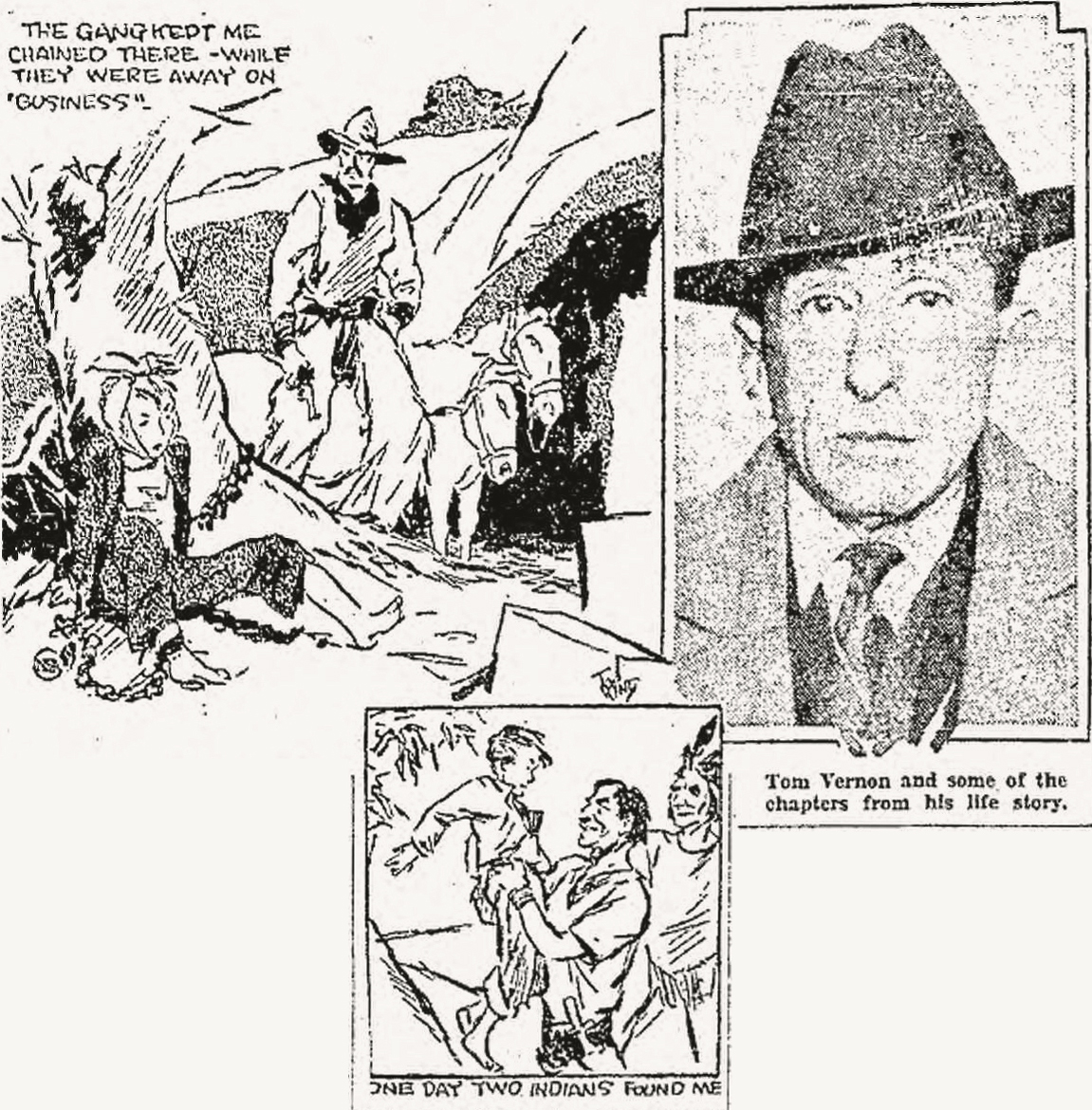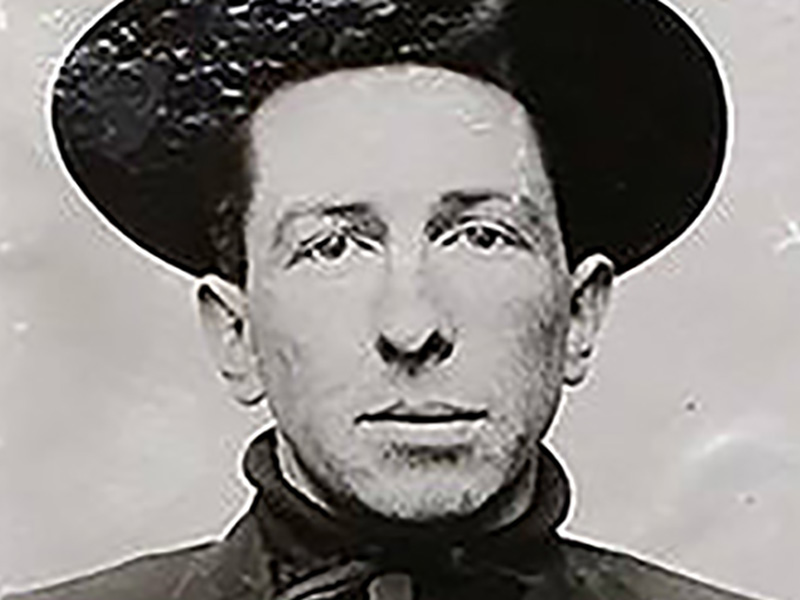Webmaster's note.
We have not been able to confirm that Tom was truthful about his parentage (or much else, for that matter).
Scroll to bottom.
Deeds of Man Jailed as California Train Robber Rival Those of Jesse James.
In a California jail, awaiting trial for a train robbery, is one of the last of the west's old-time "bad men."
Tom Vernon is the man. He is accused of holding up, single-handed, a Southern Pacific passenger train near Los Angeles in November and robbing the passengers. Wyoming authorities also charge him with a similar robbery near Cheyenne in the same month.
If convicted, Vernon faces hanging or a life in prison.
He was arrested in Pawnee, Okla., where he had gone to try to get a job on the ranch of the famous Pawnee Bill — Major Gordon W. Lillie. In jail in Pawnee, Vernon told his story to a reporter for The Evening Times and NEA Service.
That story — his own story of his life of outlawry — is being presented in three chapters.
It is, in a way, the autobiography of the last of the wild western bad men — the kind of story that belongs to an age that is gone.
Pawnee Bill, after hearing it, remarked:
"I have known Jesse and Frank James, the Dalton brothers, and other famous outlaws. I have heard them tell of their daring deeds.
"Vernon's feat — if he is the one who did it — of holding up, single-handed, two fast passenger trains, is the nerviest piece of outlawry I ever heard described."
What follows is Vernon's own story, taken down in his cell.
 By Tom (Buffalo) Vernon
By Tom (Buffalo) Vernon
(As told to Jim Hopkins, NEA Service Writer)
Cattle Kate was my mother and Jim Averill was my dad.
When I was five years old I saw the two of them hanged — hanged as cattle rustlers by a gang of cattle men in a little grove of cottonwoods in Wyoming.
The gang that hanged them also shot my ten-year-old brother dead and put a bullet through my jaw when we tried to help mother.
That was my start in life. It's about the earliest thing I can remember.
Now I'm going to be tried for a train robbery, and they're calling me "the last of the bad men." I never killed a man in my life — but I do think that I almost had a right to.
After I saw my mother hanged I was kept a prisoner in a mountain cave. Then an Indian chief rescued me and I grew up on a tribal reservation. By the time I was 12 I was riding bucking bronchos [sic] in the Madison Square Garden with Buffalo Bill's show. I've traveled all over the world. I spent eight years in the army, was wounded in the Boxer rebellion in China, took a turn in the movies, punch cattle all over the west, rode with Pawnee Bill, rubbed shoulders with outlaws, senators, millionaires and prominent folks and served five years in penitentiaries from Pennsylvania to California.
I've been everywhere but to school and hell. And here I am waiting to be tried for robbing a train.
I'd better stick at the beginning. They hanged my mother and blackened her name to it sticks yet. She is known as a cattle rustler, a lady wild cat, a dare-devil who rode, cursed and shot her way to a justified end. She was the first woman ever hanged in Wyoming.
All right. Now listen to my side of the story.
My mother's real name was Ella Watson. She staked a claim in Carbon county, Wyo., years ago. It was right next to a claim held by my dad, Jim Averill, who was a storekeeper and postmaster in a small settlement there. Pretty soon she moved into his house, and they lived happily from then on — until they were hanged.
My brother and I were born, and dad and mother were trying to make an honest living. No, they were never married; but they were honest, law-abiding folks, to the end of their lives.
You've heard about the big cattle war in Wyoming. But you've only heard the big cattle men's side of it. My side is different.
In those days Wyoming was just one big cattle range. The big cattle men ran things. They didn't like small settlers coming in. It broke up the range. There was a good deal of cattle-rustling going on; but pretty soon it got so every small settler was accused of it, whether he was honest or not. The big fellows wanted 'em out of there.
Well, my dad and mother had collected quite a few cattle. Dad used to trade merchandise for stock; and mother used to have a lot of friends, and she had been able to build up a little herd. Together the two of them finally got about 80 head together. That brought on their deaths.
One evening in 1889 a band of fellows rode up to our house and got dad and mother. They led them to a cottonwood grove, and my brother and I trailed along.
I don't remember everything very clearly — I was just a little shaver. But when they put a rope around mother's neck my brother and I tried to fight them. Imagine! I was five and he was 10. They shot us both — killed my brother, and just wounded me.
Then they hanged dad and mother, and carried me on to a cave in the Black Hills of South Dakota.
The next thing I can remember after that night there in the cottonwoods is being chained to a stump outside that cave in the Black Hills. The gang — posse, they called themselves, and maybe they really were deputies, because the cattle men ran Wyoming in those days — the gang kept me chained there every day while they were away on "business." And I've got a good idea about the kind of business they were on.
Anyway, I was just a kid, and I was wounded, and lonely, and scared, and things were pretty tough. Sometimes they would be gone a day or so, and then I wouldn't get anything to eat. I don't know what they figured on doing with me.
Since then I've learned that the cattle war was going on in dead earnest while I was imprisoned there. Posses were roaming the state, and perfectly innocent settlers, like my dad and mother, were being lynched as rustlers and their herds were being seized by the big cattle men.
I know that isn't the way everybody looks on that cattle war. But this is my side of the story.
Those stockmen were conducting a regular campaign to terrorize the small settlers so they'd move out and leave all of Wyoming for the big fellows. They spent thousands of dollars hiring assassins and sending out publicity that the state was full of rustlers that they had to wipe out.
Of course, I didn't know anything about it then. I got most of the dope years later when I was in Folsom prison in California and one of my guards was a man who'd been U.S. marshal in Wyoming in those days and knew the inside of it all. Then I corresponded with a lot of people who had lived there and got more evidence.
I don't know how long I'd have stayed in that cave, chained, or what would have happened to me. But one day, while the gang was away, two Indians happened along and found me. They broke the chain and took me back with them to the Sioux reservation, where they turned me over to Old Iron Tail, their chief.
Tomorrow: Indians, cow ponies and soldiers.
Webmaster's note.
An entry in "Women in World History: A Biographical Encyclopedia" (2002) indicates that Ellen Waston, aka Cattle Kate, had no children. Here's an exerpt:
American homesteader accused of cattle rustling who became the first woman lynched in Wyoming Territory, in a hanging carried out by a group of ranchers for their self-interests. Name variations: Ella Watson; Ellen Liddy Pickell; "Cattle Kate"; also mistakenly known as Kate Champion and Kate Maxwell. Born Ellen Liddy Watson on July 2, 1861, in Arran Township, Ontario, Canada; died on July 20, 1889, in Sweetwater Valley of Wyoming Territory, by hanging; daughter of Thomas Lewis (a farmer) and Frances (Close) Watson; learned to read and write at homestead school; married William A. Pickell, on November 24, 1879 (divorced 1886); married James Averell or Averill, on May 17, 1886; no children.
Moved with family to farm near Lebanon, Kansas (1877); after leaving first marriage, worked as cook and domestic employee in Nebraska and Wyoming until filing a homestead claim in Sweetwater Valley, Wyoming; accused, with Averell, of cattle rustling by cattle ranchers who seized and lynched them (1889); newspapers owned by cattle interests charged her with being a prostitute and accepting stolen cattle as payment.
Newspaper courtesy of Lauren Parker | "Cattle Kate" reference courtesy of Jason Brice.


























